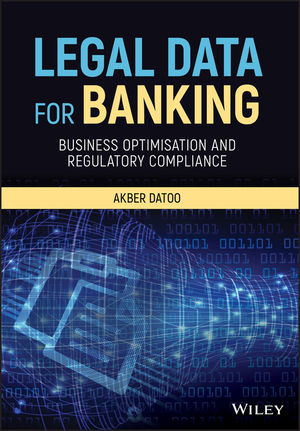The value of data is said to overtake that of oil, but nowhere else it appears to be worth more than in finance. The Global Financial Crisis of 2007-2008 was caused by poor risk data management, and the regulators’ unawareness of accumulated systemic risk stemming from contractual obligations. In a new book, Akber Datoo argues that in order to avoid repeating history, today’s banks must be proactive in legal data management. PlanetCompliance spoke to him about LegalTech, RegTech and data that is at the core of these sectors plus what it means for the future of Lawyers and Compliance Officers.
PlanetCompliance: Your book starts with a chapter on The Role of Data in the Financial Crisis, its causes and the regulatory reform, i.e. the large amount of regulation that has been introduced since. Do you think these regulations have made the financial system a safer place?
Akber Datoo: The intention of the regulation is positive, but the implementation has been fragmented. This has made the financial world a more complex place. This concerns me – financial regulation seeks to address stability and safety. It is especially ironic as a large part of the 2007-2008 financial crisis was, to some extent, as a result of excessive complexity and not being able to understand and manage the risks this created. It is rather strange to be in a position where after an ensuing decade of regulation, it is a far more complex banking and finance world.
Has it made it safer? It certainly makes firms and individuals think more about what they are doing and forced a number of mandatory fail-safe breaks to be in place. Through this, it is a safer place. It isn’t however, the right place though in terms of facilitating and supporting the important function the banking and finance industry plays in society and the generation of business value.
Regulation has put a requirement in place for provision of data and reporting to try and address the market visibility and transparency issues. It is not yet a safer place because we don’t have the right data and governance of it to be able to truly optimise decision making and balance risk and reward.
It is something I discuss at length in the book – the absence of legal data standards. Complex financial instruments are simply a series of contractual obligations rather than tangible and physical goods. Understanding their terms is therefore crucial to manage risk and resource management (across for example, capital, collateral and liquidity). We are all now creating legal agreement data to report and use. But we all do this in our own specific way, limiting standardization of business processes and interoperability of systems. It is often non consumable outside of the specific silo that created it. This severely constrains its value and does not give us the insight we need to make that financial system a safer place.
PlanetCompliance: When we talk about the myriad of regulations that have been issued, a lot of people believe that the traditional approach to Compliance no longer works and that only through the use of RegTech solutions firms will be able to cope. Do you agree and what are your thoughts on the future of the compliance profession, i.e. will machine make compliance officers obsolete?
Akber Datoo: We were talking about the quantitative models that played a significant part in the crisis and the lesson to not take them at face value. We need to challenge where necessary and not just accept for example, that a triple-A rating is correct.
In the same way, we cannot simply rely on AI and machine learning as a panacea. We should not just accept the “black-box”, but ensure we look through the decision making and test this thoroughly. It is crucial that we apply this to LegalTech and RegTech, how we create models and our decision-making, as if we do that, the value proposition of these tools is immense and something I very much look forward to seeing being developed further.
Compliance officers won’t be made obsolete by RegTech solutions but will be empowered to be able to move away from the high volume and repetitive tasks that are almost administrative in nature – and concentrate on those parts that need human analysis and judgement.
PlanetCompliance: Another profession closely related to compliance is touted to come under pressure because of the progress being made in innovative technologies such as AI and blockchain. You are yourself a qualified lawyer, what do you think the future holds for your colleagues?
Akber Datoo: The future is bright – provided we are bold and confident enough to seize the opportunity. The opportunity is vast because of the lack of innovation and disruption for hundreds of years in the legal profession. There is the potential to change mindsets – the traditional legal approach is not one of change and transformation, but of precedent and conservatism. There are so many inefficient ways in which the legal profession operates, because that is the way we have done them before. Technology can be a real enabler to allow lawyers to be a strategic part of the business and not just a support function, so this should be a very exciting time for those willing to embrace change within the profession.
PlanetCompliance: In what areas has LegalTech made the biggest impact and in which lies its biggest potential?
Akber Datoo: To date, the impact has been in efficiency gains and cost reduction. This has been through document generation tools, negotiation platforms, workflow, document management systems and basic contract data extraction.
In terms of its biggest potential, this has to be through the use of legal data analytics and combining this with other data domains to then allow us to create real business and risk insight. So, taking legal agreement, opinion and regulatory data – and combining this with client, product and market data will open up a number of fantastic opportunities to unlock business value. There is much talk about Blockchain, DLT and smart contracts but until we sort out the data these rely on, it will be very difficult to unlock this value.
D2LT has made huge strides working with market participants to help them understand the value of legal data and the way in which LegalTech can be used to unlock its business value, and we are now starting to see firms that took strategic approaches to legal data in the onslaught of regulation, seeing the benefit of that – not only from a regulatory compliance perspective, but to drive their business decision-making.
PlanetCompliance: Talking about Smart Contracts, you close the chapter in the book on Smart contracts, DLT and Blockchain, with a cautious warning, citing David Furlonger, Vice President and Gartner Fellow, who like others has said that blockchain and smart contracts are ‘solutions looking for a problem’. The Financial Times ran an equally negative piece on the future of Blockchain now that the honeymoon period is over. Are the pessimists/realists right or where do you see this development going?
Akber Datoo: We are still looking for the right problem to solve. If organizations use blockchain, so that they can tick an innovation box, we are not in a good place because we are not finding these real use cases where it is genuinely needed and changing things for the better (it is just a costly exercise for momentary PR!). I believe that when we find the right use case and the genuine use changes, coupled with the right legal framework and data standards being in place, it will be truly transformative to the banking and finance industry, but we have a lot of work to do still and therefore are some way away from that.


